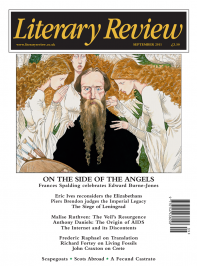Ruth Scurr
After Such Knowledge
Wicked Company: Freethinkers and Friendship in Pre-Revolutionary Paris
By Philipp Blom
Weidenfeld & Nicolson 361pp £25
Wicked Company is a group biography of the philosophes, whose courageous and radical thought helped prepare France for the seismic political upheaval of 1789. Philipp Blom deftly delineates the friendship through which Denis Diderot and the Baron d’Holbach pursued philosophical truth and collaborated on the eighteenth century’s most ambitious publishing project: the Encyclopédie, ou dictionnaire raisonné des sciences, des arts et des métiers (which ran to twenty-eight volumes between 1751 and 1772, covering topics as diverse as azymites and tailoring). The aim of the Encyclopédie’s editors was ‘to collect all the knowledge that now lies scattered over the face of the earth, to make known its general structure to the men among whom we live, and to transmit it to those who will come after us’ – to make men not only wiser but also ‘more virtuous and more happy’. The relations of both Diderot and d’Holbach to Voltaire and Rousseau (whose posthumous reputations have fared somewhat better in the Anglophone world) are also carefully drawn; as are their connections with foreign writers and intellectuals (Friedrich Grimm, David Hume, Ferdinando Galiani and Count Beccaria) and their interactions with rare examples of freethinking women, the brilliant and wealthy Louise d’Epinay especially.
Denis Diderot was born in 1713 in the small town of Langres in northern Champagne. He was sent to Paris, aged fifteen, to complete his education and train for the priesthood, but rebelled and decided to become a playwright instead: ‘What did I have in mind? To be

Sign Up to our newsletter
Receive free articles, highlights from the archive, news, details of prizes, and much more.@Lit_Review
Follow Literary Review on Twitter
Twitter Feed
Under its longest-serving editor, Graydon Carter, Vanity Fair was that rare thing – a New York society magazine that published serious journalism.
@PeterPeteryork looks at what Carter got right.
Peter York - Deluxe Editions
Peter York: Deluxe Editions - When the Going Was Good: An Editor’s Adventures During the Last Golden Age of Magazines by Graydon Carter
literaryreview.co.uk
Henry James returned to America in 1904 with three objectives: to see his brother William, to deliver a series of lectures on Balzac, and to gather material for a pair of books about modern America.
Peter Rose follows James out west.
Peter Rose - The Restless Analyst
Peter Rose: The Restless Analyst - Henry James Comes Home: Rediscovering America in the Gilded Age by Peter Brooks...
literaryreview.co.uk
Vladimir Putin served his apprenticeship in the KGB toward the end of the Cold War, a period during which Western societies were infiltrated by so-called 'illegals'.
Piers Brendon examines how the culture of Soviet spycraft shaped his thinking.
Piers Brendon - Tinker, Tailor, Sleeper, Troll
Piers Brendon: Tinker, Tailor, Sleeper, Troll - The Illegals: Russia’s Most Audacious Spies and the Plot to Infiltrate the West by Shaun Walker
literaryreview.co.uk